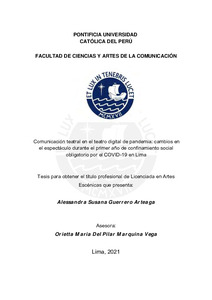| dc.contributor.advisor | Marquina Vega, Orietta Maria Del Pilar | |
| dc.contributor.author | Guerrero Arteaga, Alessandra Susana | |
| dc.date.accessioned | 2022-05-09T16:00:41Z | |
| dc.date.available | 2022-05-09T16:00:41Z | |
| dc.date.created | 2021 | |
| dc.date.issued | 2022-05-09 | |
| dc.identifier.uri | http://hdl.handle.net/20.500.12404/22280 | |
| dc.description.abstract | La comunicación teatral es el término que hace referencia al proceso comunicativo entre
el espectáculo y su espectador. El espectáculo teatral es un conjunto de diferentes
elementos o estímulos, y es a través de estos que interactúa con su espectador. Es
justamente este último quien tiene un rol activo en este proceso al responder al
espectáculo con sus propios mensajes y estímulos. Sin embargo, en el contexto de la
pandemia por el COVID-19, el teatro se ve trasladado a un espacio de representación en
el medio digital, donde los cuestionamientos sobre la presencia de una comunicación
teatral real y efectiva se hacen presentes. Esta investigación cualitativa caracteriza las
formas en las que la comunicación teatral se presenta en los espectáculos de teatro digital
en la ciudad de Lima, objetivo que se alcanzó realizando entrevistas a profesionales de
las áreas de dirección, producción y actuación, que participaron del teatro digital en el
año 2020. Profundizando en cómo las nuevas condiciones de creación y realización de
estos espectáculos generan cambios en el proceso de comunicación teatral entre estas
propuestas y su público. De esta manera se concluye que la comunicación teatral en el
teatro digital de pandemia se caracteriza por aprovechar la performatividad de los
recursos digitales haciendo uso de la mediación tecnológica para adaptarse a comunicar
en su nuevo contexto, mantener la teatralidad del espectáculo generando un balance entre
el uso de los recursos tradicionales del teatro y el uso de la tecnología, y preservar la
comunicación con el espectador en una versión adaptada haciendo uso de nuevos canales
de interacción propios de la virtualidad. | es_ES |
| dc.description.abstract | Theatrical communication is a term that refers to the communication between a theatrical
show and its audience. The Theatrical show is a set of different elements and incentives
that are used to interact with the audience, which has an active role in this process by
using its own set of incentives. However, in the context of the COVID-19 pandemic,
theater has been transferred to a new stage on digital media, a stage where questions about
the development of effective theatrical communication begin almost immediately. This
qualitative research characterizes the ways theatrical communication presents itself in
digital theater shows from the city of Lima, Peru. This objective was achieved by
interviewing directors, producers, and actors who were involved in digital theater plays
during 2020. These interviews help the research delve into how the new conditions for
the creation and performance of these shows generated changes in the theatrical
communication process between these shows and the audience. Finally, it is concluded
that theatrical communication in pandemic digital theater is used to capitalize on the
performativity of digital resources, utilizing technological mediation to adapt
communication in its new context, maintaining the theatricality of the show, generating a
balance between the use of traditional theater resources and the use of technology, and
preserving communication with the audience in an adapted version by making use of
typical virtuality interaction channels. | es_ES |
| dc.language.iso | spa | es_ES |
| dc.publisher | Pontificia Universidad Católica del Perú | es_ES |
| dc.rights | info:eu-repo/semantics/openAccess | es_ES |
| dc.rights.uri | http://creativecommons.org/licenses/by-nc-nd/2.5/pe/ | * |
| dc.subject | Teatro y comunicación | es_ES |
| dc.subject | COVID-19 (Enfermedad)--Impacto | es_ES |
| dc.subject | Industrias culturales--Perú--Lima | es_ES |
| dc.title | Comunicación teatral en el teatro digital de pandemia: cambios en el espectáculo durante el primer año de confinamiento social obligatorio por el COVID-19 en Lima | es_ES |
| dc.type | info:eu-repo/semantics/bachelorThesis | es_ES |
| thesis.degree.name | Licenciado en Artes Escénicas | es_ES |
| thesis.degree.level | Título Profesional | es_ES |
| thesis.degree.grantor | Pontificia Universidad Católica del Perú. Facultad de Ciencias y Artes de la Comunicación. | es_ES |
| thesis.degree.discipline | Artes Escénicas | es_ES |
| renati.advisor.dni | 08717493 | |
| renati.advisor.orcid | https://orcid.org/0000-0001-6019-8934 | es_ES |
| renati.author.dni | 48025770 | |
| renati.discipline | 215046 | es_ES |
| renati.juror | Bejar Miranda, Marissa Violeta | es_ES |
| renati.juror | Zevallos Trigoso, Carlos Andres | es_ES |
| renati.juror | Marquina Vega, Orietta Maria Del Pilar | es_ES |
| renati.level | https://purl.org/pe-repo/renati/level#tituloProfesional | es_ES |
| renati.type | https://purl.org/pe-repo/renati/type#tesis | es_ES |
| dc.publisher.country | PE | es_ES |
| dc.subject.ocde | https://purl.org/pe-repo/ocde/ford#6.04.04 | es_ES |






